According to the leader of the Ministry of Foreign Affairs, Mr. Xi Jinping's visit to Vietnam brings practical benefits to the people of the two countries, contributing to peace, stability and development in the region and the world.
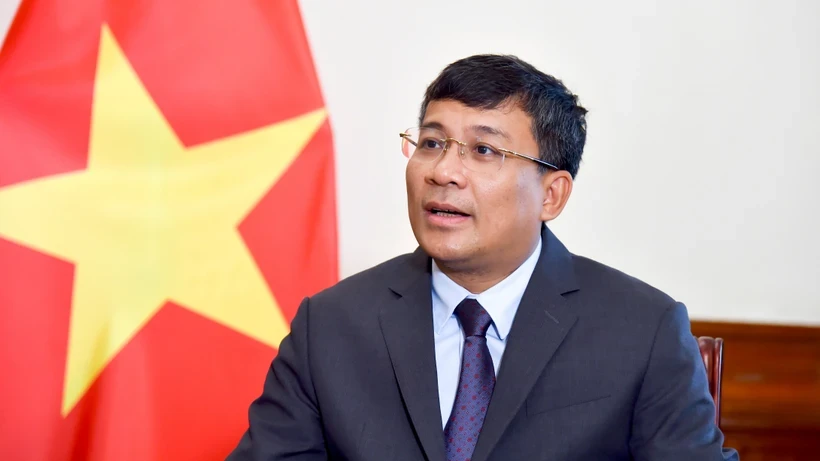
At the invitation of General Secretary of the Central Committee of the Communist Party of Vietnam To Lam and President of the Socialist Republic of Vietnam Luong Cuong, General Secretary of the Central Committee of the Communist Party of China and President of the People's Republic of China Xi Jinping paid a State visit to Vietnam from April 14 to 15.
On April 16, Permanent Deputy Minister of Foreign Affairs Nguyen Minh Vu shared with the press the results of the State visit to Vietnam by General Secretary and President of China Xi Jinping.
Signing 45 cooperation documents in many fields
- Could you please evaluate some outstanding results of the State visit to Vietnam by General Secretary and President of China Xi Jinping?
Permanent Deputy Minister Nguyen Minh Vu: The visit is the most important foreign political event for Vietnam-China bilateral relations this year and has even more special significance as it takes place during the Year of Humanitarian Exchange, commemorating the 75th anniversary of the establishment of diplomatic relations between the two countries (1950-2025).
On the very first day of the visit, for the first time, General Secretary To Lam had an article published in the People's Daily - the mouthpiece of the Central Committee of the Communist Party of China, while General Secretary and President Xi Jinping had an article published in Vietnam's Nhan Dan Newspaper.
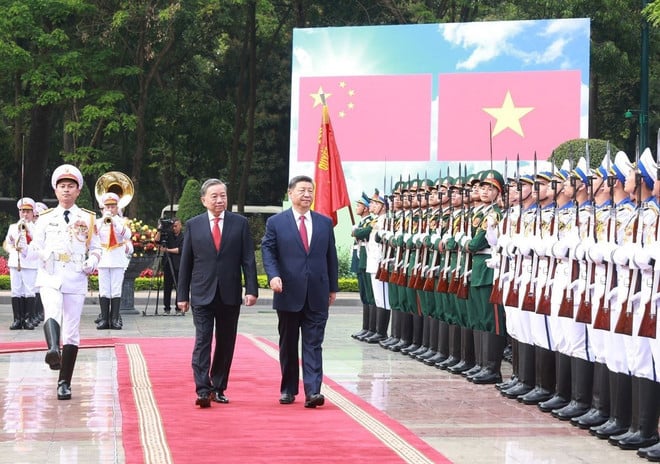
The Party, State and people of Vietnam have given the high-ranking delegation of the Party and State of China a warm and thoughtful welcome, demonstrating friendship, sincerity and high regard for the bilateral relationship and for General Secretary and President Xi Jinping personally.
General Secretary To Lam, President Luong Cuong, Prime Minister Pham Minh Chinh, and National Assembly Chairman Tran Thanh Man all had very effective meetings with General Secretary and President Xi Jinping, discussing extensively bilateral relations and regional and international issues of mutual concern.
General Secretary To Lam and President Luong Cuong together with General Secretary and President Xi Jinping attended the Vietnam-China People's Friendship Meeting and the Launching Ceremony of the "Red Journey of Youth Research and Study"; General Secretary To Lam and Prime Minister Pham Minh Chinh together with General Secretary and President Xi Jinping attended the Launching Ceremony of the Vietnam-China Railway Cooperation Mechanism.
It can be said that the two sides coordinated to arrange a very rich, effective and in-depth visit program, with high-level talks and meetings, strategic exchanges and friendly contacts and conversations between General Secretary To Lam and key leaders with General Secretary and President Xi Jinping.
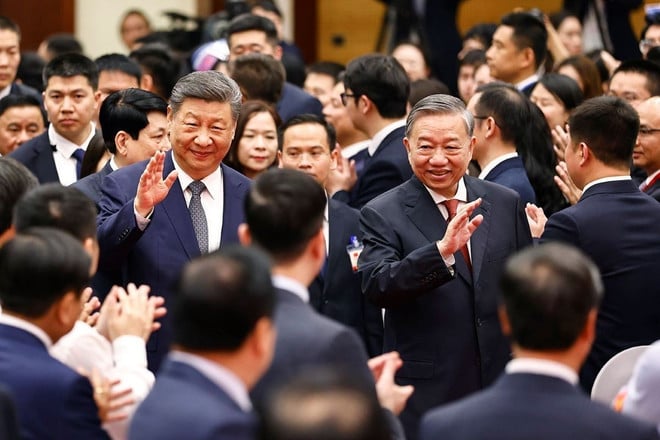
The State visit to Vietnam by General Secretary and President of China Xi Jinping and the high-ranking delegation of the Chinese Party and State was a great success; the leaders of both sides affirmed that the visit became a new milestone in the friendly neighborly relationship, the Comprehensive Strategic Cooperative Partnership, and the Vietnam-China Community of Shared Future of strategic significance. The outstanding results of this historic visit are clearly demonstrated in the following aspects:
Firstly, maintain strategic exchanges at the highest level between the two sides after Vietnam has completed the Senior Leadership of the Party, State, Government and National Assembly agencies; further consolidate and strengthen political trust, and orient the stable and healthy development of bilateral relations in the context of the complicated developments in the international and regional situation.
The senior leaders of the two Parties and two countries affirmed the high importance that each Party and State attaches to the bilateral relationship, as well as the special role and position of the bilateral relationship in the overall foreign policy of each country. Vietnam affirmed that it always considers developing relations with China an objective requirement, a strategic choice and a top priority in its foreign policy of independence, self-reliance, diversification and multilateralization of foreign relations. China affirmed its persistence in its policy of friendship, always considering Vietnam a priority direction in China's overall foreign policy of neighborliness.
The two sides agreed to promote the role of Party diplomacy and State diplomacy, including cooperation between the two governments, the National Assembly/National People's Congress, the Fatherland Front/People's Political Consultative Conference of the two countries; strengthen cooperation in key and strategic areas such as diplomacy, defense, and public security; and upgrade the 3+3 Strategic Dialogue mechanism between the Ministries of Foreign Affairs, Defense, and Public Security to the ministerial level.
Second, agree on directions, measures, and key contents to promote substantive cooperation areas in the coming time.
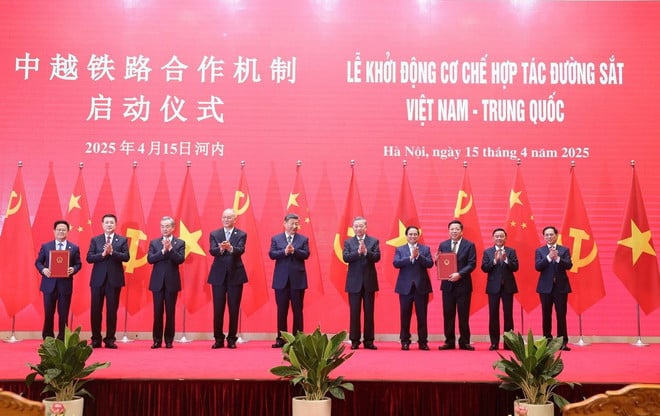
In particular, both sides affirmed their importance and desire to elevate substantive cooperation towards higher quality, more efficiency, and more practicality; promote the creation of new "bright spots" in cooperation in areas where Vietnam has demand and China has strengths such as standard gauge railways, agricultural trade, science and technology, AI, education and training, digital economy, green economy, etc. The two sides agreed to establish a mechanism for the Railway Cooperation Committee between the two Governments to promote cooperation in the construction of the Lao Cai-Hanoi-Hai Phong, Lang Son-Hanoi, Mong Cai-Ha Long-Hai Phong standard gauge railway projects; agreed to coordinate well in organizing activities of the Vietnam-China Humanitarian Exchange Year, contributing to consolidating a solid social foundation for bilateral relations; and speeding up the progress of China's non-refundable aid projects for Vietnam.
Third, the visit achieved the largest number of documents and the most diverse fields ever, including a Joint Statement and 45 cooperation documents between ministries, branches, agencies and localities of the two sides.
At the end of the visit, the two sides issued a "Joint Statement on Continuing to Deepen the Comprehensive Strategic Cooperative Partnership, Promoting the Building of a Strategically Significant Vietnam-China Community of Shared Future" with comprehensive content, both providing strategic orientation and clearly identifying specific focuses, meeting our requirements and harmonizing the interests of both sides, which is one of the joint documents with the richest content and highest quality ever.
The two sides have signed 45 cooperation documents in a wide range of fields, creating a solid foundation to promote comprehensive cooperation between the two countries, commensurate with the new position, content, and level of bilateral relations. Among them, there are government-level cooperation documents of special importance, meeting the needs of breakthrough and sustainable development of Vietnam, having a long-term impact on the country's development in the new era. 45 cooperation documents are a telling number, demonstrating the current vibrant, substantive, diverse, and increasingly closely intertwined cooperation situation between the two countries.
Sticking to the spirit of the Joint Statement
- Mr. Deputy Minister, from the achieved results, what direction will the two sides take to implement actions so that the Vietnam-China bilateral relationship will increasingly develop in the direction of "6 more" as proposed by the two countries' senior leaders?
Permanent Deputy Minister Nguyen Minh Vu: The State visit to Vietnam by General Secretary and President of China Xi Jinping was a great success in all aspects; the results achieved during the visit were extremely rich and outstanding, having positive and long-term significance for bilateral relations and the development of each country, in the context that both countries are entering a new era, a new time.
To effectively implement the important results achieved during the visit, I believe that in the coming time, the two sides need to closely follow the spirit of the Joint Statement and the common perceptions of the two sides' senior leaders, take the Year of Humanitarian Exchange to celebrate the 75th anniversary of the establishment of Vietnam-China diplomatic relations as an opportunity, continue to deepen the Comprehensive Strategic Cooperative Partnership, promote the building of a Vietnam-China Community of Shared Future with strategic significance, promote mutually beneficial cooperation with higher quality, develop strategic coordination between the two countries more deeply, bring more practical benefits to the people of the two countries, focus on promoting cooperation in the following key aspects:
First, maintain regular exchanges of delegations and contacts at high and all levels to continue to consolidate and jointly raise strategic trust to a higher level.
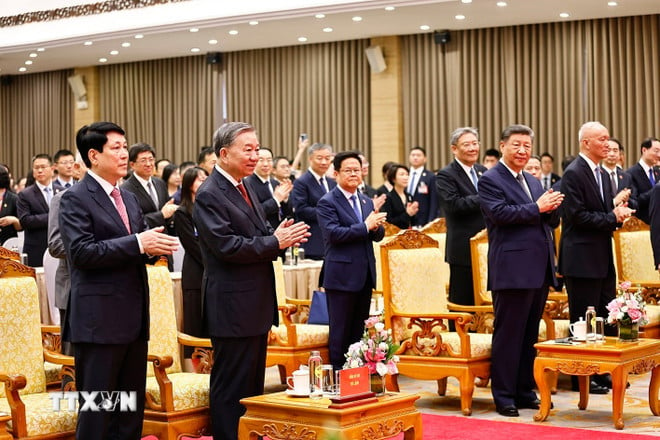
Through many flexible forms such as mutual visits, sending special envoys, hotlines, sending letters, increasing official bilateral contacts and at multilateral forums, promptly exchanging opinions on relations between the two Parties and two countries, major issues of mutual concern as well as the international and regional situation, firmly grasping the correct development direction of Vietnam-China relations.
Fully promote the unique role of Party-channel diplomacy, organize well high-level meetings between the two Parties, theoretical seminars, cooperation in training officials, and delegation exchanges through Party channels. Strengthen State diplomacy, exchanges, and cooperation between the Governments, National Assembly/People's Congress, Fatherland Front/CPPCC of the two countries, including coordinating to organize well the first session of the Inter-Parliamentary Cooperation Committee between the National Assembly of Vietnam and the National People's Congress of China.
Further strengthen the overall coordination role of the Steering Committee for Bilateral Cooperation in areas of cooperation between the two sides; effectively implement the “3+3” Strategic Dialogue at the level of the Ministers of Foreign Affairs, National Defense, and Public Security.
Build a more substantial pillar of defense-security cooperation through strengthening exchange and cooperation mechanisms on defense, public security, security, justice, courts, and procuracies.
Second, to enhance substantive cooperation in key areas, in order to concretize the Joint Statement and agreements reached during the visit.
The top priority in the current period is to accelerate the connection of development strategies between the two countries, first of all connecting infrastructure of standard gauge railways, expressways, and smart border gate infrastructure; researching and implementing cooperation in technology and human resource training for the Lao Cai-Hanoi-Hai Phong, Lang Son-Hanoi, Mong Cai-Ha Long-Hai Phong standard gauge railway projects; accelerating the construction of smart border gates at Huu Nghi-Huu Nghi Quan International Border Gate, creating a basis for replication to other border gates if conditions are met; upgrading the "soft connection" of smart customs, facilitating the import and export of goods; promoting the restoration and opening of more flights to meet market demand.
Promote cooperation in emerging areas such as artificial intelligence, clean energy, green economy, digital economy, and 5G technology application; enhance information exchange and experience sharing in policy management in the financial-monetary sector, reform and management of state-owned enterprises; actively research and pilot the implementation of the cross-border economic cooperation zone model, expand the scope of payment in local currency; research and implement cooperation in key mineral sectors.
Encourage and support enterprises with real strength, prestige and advanced technology from one country to invest in the other, promote substantive cooperation in areas such as high-tech agriculture, air pollution treatment in large cities. Speed up the implementation of non-refundable aid projects such as the construction of the Vietnam Academy of Traditional Medicine, Campus 2, and the maintenance of the Vietnam-China Friendship Palace. Make science and technology cooperation a new highlight, research and develop cooperation in areas such as AI, semiconductors, nuclear energy, etc.
Third, strengthen people-to-people exchanges and consolidate a solid social foundation for building a Vietnam-China Community of Shared Future.
Organize well the activities of the Vietnam-China Humanitarian Exchange Year 2025; effectively implement the program "Red Journey of Youth Research and Study"; promote cooperation between press, news, publishing, radio and television agencies. Further promote cooperation in education and training, especially vocational training, training in science and technology, language training; enhance exchanges between universities, colleges, and research institutes.
Strengthen exchanges and policy coordination to improve the quality and effectiveness of cultural and tourism cooperation; enhance exchanges between political and social organizations and mass organizations such as trade unions, women's organizations, and youth organizations; actively support localities of the two countries, especially border provinces (areas) to implement exchanges and cooperation.
Fourth, maintain close coordination, cooperation and mutual support in multilateral mechanisms and forums of which the two countries are members.
Based on the wishes, interests and common concerns of both sides, strengthen exchanges and coordination in multilateral mechanisms, especially the United Nations, WTO, APEC, ASEM, ASEAN, RCEP, GMS, Mekong-Lancang, etc.; support each other's candidates for positions in international organizations; support each other to successfully organize the APEC Conference in 2026 and the APEC Conference in 2027.
Fifth, coordinate well in managing land borders; better control and resolve disagreements, and together maintain peace and stability at sea.
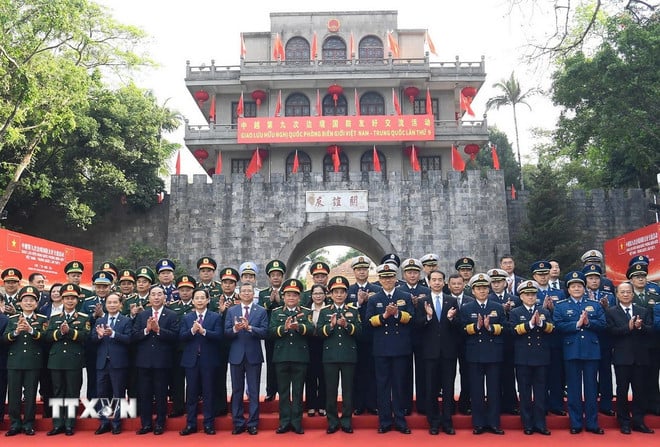
Promote the mechanisms of the Joint Land Border Committee and the Vietnam-China Land Border Gate Management Cooperation Committee; effectively implement the three legal documents on land borders and related agreements; strengthen border management; actively promote the opening and upgrading of border gates.
Adhering to high-level common perceptions, actively seeking fundamental, long-term solutions that are acceptable to both sides, in accordance with the “Agreement on basic principles guiding the settlement of maritime issues between Vietnam and China”, international law, including the 1982 United Nations Convention on the Law of the Sea (UNCLOS); promoting discussions on the delimitation of the sea area outside the mouth of the Gulf of Tonkin and discussions on cooperation for joint development at sea to soon achieve substantial progress. We continue to request China to properly handle the issue of fishing vessels and fishermen.
The leaders of the two countries affirmed their agreement that in the context that the two countries are at a key moment of development, aiming to realize the vision and development aspirations of each country by the middle of this century, inheriting the foundation of 75 years of relations, implementing common perceptions and the results of the visit will significantly contribute to developing the cooperative relationship between the two countries in an increasingly substantive, effective, sustainable and profound manner, bringing the comprehensive strategic cooperative partnership and the Vietnam-China Community of Shared Future to continuously deepen and develop to new heights; bringing practical benefits to the people of the two countries, contributing to peace, stability and development in the region and the world.
- Thank you very much, Deputy Minister./.
Source


![[Photo] The parade took to the streets, walking among the arms of tens of thousands of people.](https://vphoto.vietnam.vn/thumb/1200x675/vietnam/resource/IMAGE/2025/4/30/180ec64521094c87bdb5a983ff1a30a4)
![[Photo] Cultural, sports and media bloc at the 50th Anniversary of Southern Liberation and National Reunification Day](https://vphoto.vietnam.vn/thumb/1200x675/vietnam/resource/IMAGE/2025/4/30/8a22f876e8d24890be2ae3d88c9b201c)



![[Photo] "King Cobra" Su-30MK2 completed its glorious mission on April 30](https://vphoto.vietnam.vn/thumb/1200x675/vietnam/resource/IMAGE/2025/4/30/5724b5c99b7a40db81aa7c418523defe)
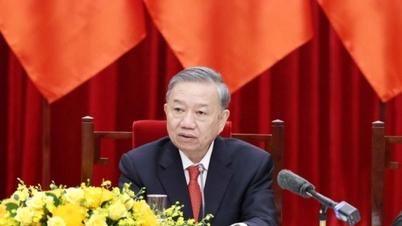

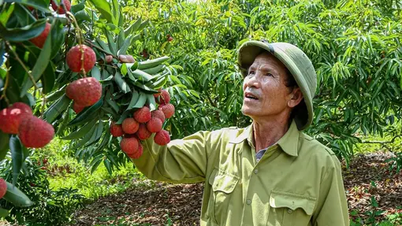

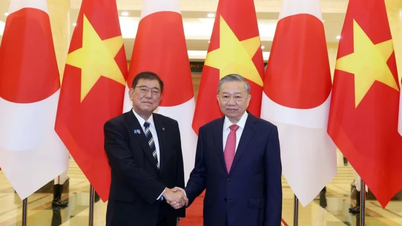


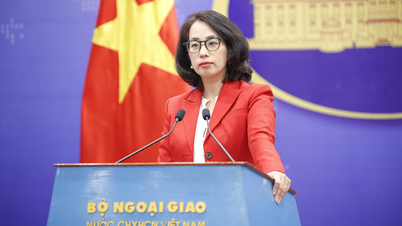

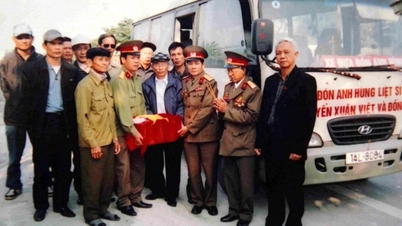
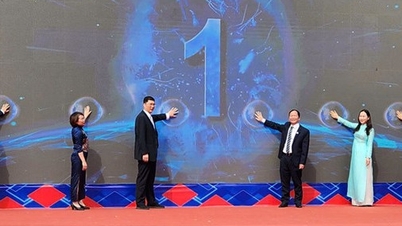

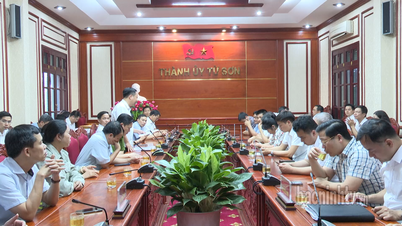
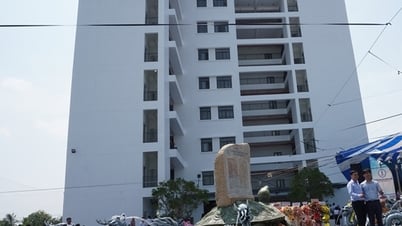
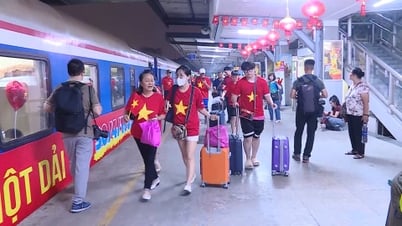




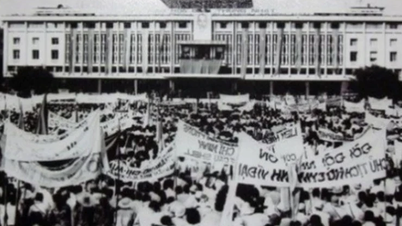

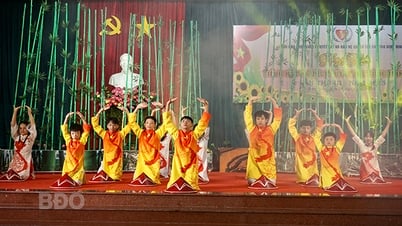
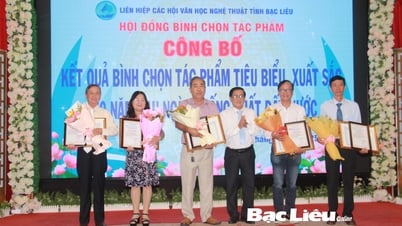
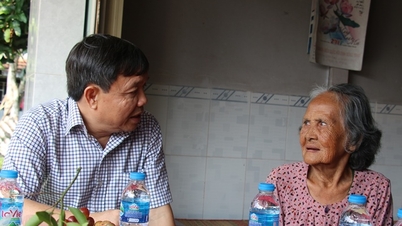





















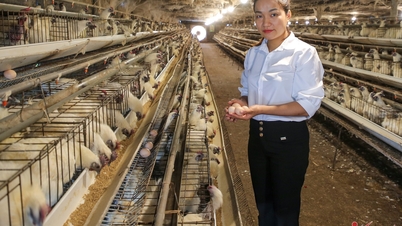




























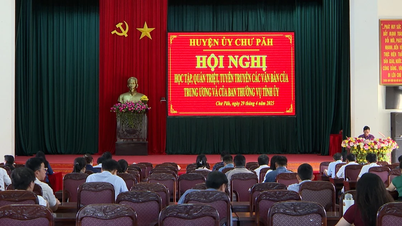

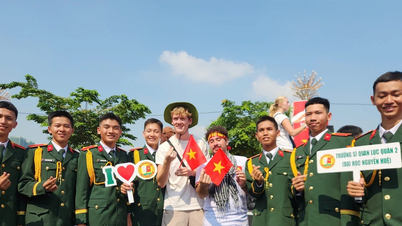
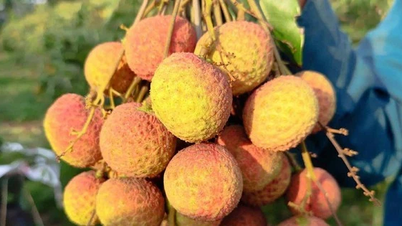













Comment (0)